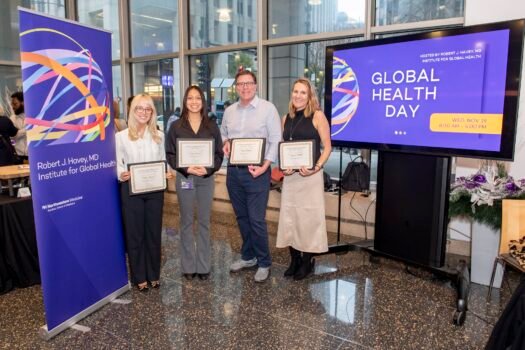
Northwestern students, faculty, staff and community partners shared and recognized global health research, education and outreach at the Robert J. Havey, MD Institute for Global Health’s 14th annual Global Health Day.
The day-long event, held on November 19 in the Robert H. Lurie Medical Research Center, featured a global health case competition, poster presentations and keynote address, with opening remarks delivered by Sahera Dirajlal-Fargo, MS, DO, associate professor of Pediatrics in the Division of Infectious Diseases and co-director of the Center for Global Pediatric Health.
“Thank you for taking the time to join us today for Havey Institute for Global Health’s annual Global Health Day. This event is an annual opportunity for global health researchers, educators, trainees and students to celebrate and discover more about global health research, education and outreach efforts throughout Northwestern, Chicago and beyond,” Dirajlal-Fargo said.
The event kicked off with an intramural global health case competition, in which teams of four to six trainees from a minimum of three schools at Northwestern pitched solutions to complex, real-world global health challenges.
The case competition was followed by a poster session in which attendees were invited to learn about new global health research led by Feinberg students, trainees, and faculty as well as community partners and institutions.

Dannielle Grayer, MD, MPH, a fellow in pediatrics, presented her research in which she spent six months in Tanzania studying inflammation, metabolic syndrome and cardiovascular disease risk in older persons living with HIV to better understand the relationship between chronic inflammation that occurs from HIV and cardiovascular metabolic outcomes.
From a cross-sectional analysis of the Tanzanian HIV and Aging Longitudinal Cohort Study, Grayer found that metabolic syndrome was consistent with rates reported across sub-Saharan Africa and compared to patients from higher-income countries, hypertension and central adiposity were most commonly observed. Metabolic syndrome severity scores were also higher in women, which Grayer said underscores the need for sex-specific targeted interventions.
“There’s not a one-size-fits-all phenotype for metabolic dysfunction and metabolic syndrome. We really need to have local data informing our practice,” Grayer said. “We need to have sex-specific approaches to risk reduction and really highlight that calculators that we are using right now that only looking at traditional risk factors are not really seeing whole picture of what risk might be there for women and populations outside of the Western world.”

Kathryn Lucas, ‘23 MD, a resident physician in pediatrics, shared her research which evaluated improvement in echocardiography knowledge and skills for pediatric resident physicians at Bugando Medical Centre in Tanzania who participated in basic and advanced echocardiography workshops. The five-day workshop consisted of both didactics and hands-on practice with live models.
At the end of the workshops, Lucas and her team found that pediatric trainees demonstrated improvements in comfort, knowledge, acquisition and interpretation of echocardiographic images, which could ultimately help pediatric patients with cardiac disease receive more timely diagnoses and treatment, said Lucas, who is also part of the McGaw Global Health Clinical Scholars program.
“The goal is to continue the workshop year after year and ultimately have the pediatric cardiologists at Bugando and some of their pediatricians facilitate the basic workshop, and we also help facilitate the advanced workshop,” Lucas said. “Next steps definitely include following up on the retention of the skills that were gained from the workshop and encouraging the residents to take every opportunity to maintain and advance those skills.”
Zora Warren, an undergraduate student at Northwestern, presented her research exploring the impact of double care and maternal age on reducing maternal morbidity rates in the U.S. Her literature review focused on doula care and its impact on cesarean sections and/or forceps-assisted deliveries.
Warren found that doulas reduce cesarean section rates by screening for maternal mental health, assisting mothers in accessing needed resources and providing culturally competent care, but that there was a lack of literature about pregnant people aged 35 years and older who have a geriatric pregnancy.
“Having that kind of support system really does decrease the rate of pre-term births and cesarean sections, and also the number of women who are hospitalized because of things like hemorrhages because of c-sections,” Warren said. “Overall, doula care could be a really great solution for the U.S. and also would also help move us toward the UN’s Sustainable Development Goals that are focused on maternal mortality and morbidity.”

Matthew Laurens, MD, MPH, professor of Pediatrics at the University of Maryland School of Medicine, delivered this year’s keynote address which explored his involvement in the development and administration of malaria and typhoid vaccines in Burkina Faso, Mali, Malawi, and Uganda in collaboration with the University of Maryland School of Medicine’s Center for Vaccine Development and Global Health.
Laurens emphasized the importance of the global health community reinvesting in building partnerships on mentoring and advocacy in response to the U.S. withdrawing from the World Health Organization and other global health agencies.
“How can we increase our use of technology and innovation to do more with less? How can we increase international cooperation to streamline workforce projects, working in harmony with the government, NGOs and international organizations? How can we educate the public and increase awareness to help knowledge, understanding and support for global public health initiatives? We have to find a way forward and we can do that together,” Laurens said.
Poster Presentation Award Recipients
- Dulce Garcia — “Genomic Surveillance and Phylodynamic Analysis of SARS-CoV-2 in Peru and Bolivia”
- Jasmine Machhi (second-year medical student) — “Ageing and Hypertension but not HIV status Predicts Kidney dysfunction among Older Adults in Urban Tanzania: A Comparative Cross-Sectional Study”
Honorable Mentions
- Philip B. Gorelick, MD, MPH — “Short-term Stroke Outcomes in a Developing Country: Early results from a low-resource stroke unit study”
- Molly Heaney (undergraduate student) — “Family Income, Sex, and Adolescent Mental Health: Analysis of the UK Millennium Cohort Study”
Global Health Case Competition Winning Teams
- 1st place: Team 3 (Imaan Arshad, Diya Bhakta, Kaylee Henry, Amy Petschek, Sarah Huang, Sharlet Mathew) — “Faith in Immunity: A Campaign for Reducing Malaria Cases in Nigeria”
- 2nd place: Team 2 (Joseph Biju, Shail Belani, Sanjana Shankar, Erika Ruiz-Yamamoto) — “Kare Yaranmu ‘Protect our Children’ An Adaptable, Multi-Pronged Malaria Intervention”
- 3rd place: Team 1 (Cheryl Tang, Evan Morgan, Shreeniket Bendre, Aryan Kalluvila) — “#RoadToImmunity”









